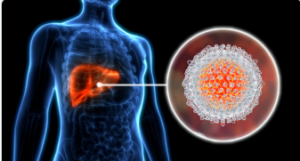Hepatitis C
What is Hepatitis C?
Hepatitis C is swelling or inflammation of the liver which is caused by the hepatitis C virus (HCV). There is no vaccine to prevent HCV. Newer antiviral medicines can cure HCV in almost all cases.

How is it spread?
HCV is spread through contact with blood. This can happen by sharing needles, syringes or other equipment used to inject drugs. Infected blood may also transfer person-to-person by sharing razors, nail clippers, toothbrushes or sharing person medical equipment like glucose monitors. HCV can be spread when getting tattoos or piercings with non-sterile instruments. A pregnant woman can give the infection to her unborn baby. While uncommon, HCV can spread during sexual contact. Most reported cases occur among men who have sex with men.
Who is at risk for HCV?
Anyone age 18 to 79 with the following risks should be tested for HCV.
- Anyone who has ever injected, snorted or inhaled an illegal drug.
- Sexual partners of anyone diagnosed with HCV.
- Anyone with HIV.
- Men who have sex with men.
- Pregnant females.
- Babies born to someone with HCV.
- Anyone who has been in prison.
- Healthcare workers who are in contact with blood/have been stuck with a needle.
- People who received donated blood or had organ transplant before 1992.
- Anyone taking PrEP.
- Anyone receiving unscreened blood.
- Having dental procedures abroad.
How can I lower my risk of getting HCV? 

Everyone can lower risk of infection by avoiding behavior that spreads infection.
- Avoid sharing needles, syringes or other drug equipment.
- Avoid getting tattoos or body piercings at unregulated facilities.
- Avoid sexual contact with someone who has the infection.
- Maintain a monogamous relationship with someone who has been tested and does not have an infection.
What are the symptoms of Hepatitis C Virus (HCV)?
HCV affects people differently. It begins with an acute phase that rarely causes symptoms. Long-term, or chronic, HCV usually takes decades for symptoms to appear. Symptoms only appear after the virus has damaged the liver enough to cause them.
HCV symptoms may take many years to appear so many people don’t know they have it. This is why regular testing is so important.
Acute Symptoms |
Chronic Symptoms |
| * Jaundice (yellowing of the skin or eyes) | * Bleeding/bruising easily |
| * Dark-colored urine or clay-colored poop | * Dark-colored urine |
| * Fatigue, nausea, stomach pain, fever, muscle aches | * Lack of appetite, weight loss, fatigue |
| * Jaundice (yellowing of the skin or eyes) | |
| * Dark-colored urine | |
| * Fluid build-up in stomach area, swelling in legs | |
| * Spiderlike blood vessels on the skin |
What test is done to diagnose Hepatitis C Virus (HCV)?
HCV is diagnosed through a blood test. The sample is sent to a lab and results are provided within a few days. All partners of a person diagnosed with HCV should be tested.
Full STI testing (chlamydia, gonorrhea, herpes, syphilis, trichomoniasis, and HIV) is recommended for all people who are sexually active. Full testing is recommended with every new partner.
Schedule an appointment at Lexington-Fayette County Health Department’s STI Clinic
Lexington-Fayette County Health Department operates a specialty STI Clinic that will test, diagnose and treat those exposed to or with current STIs.
What is the treatment?
Most treatments involve 8 to 12 weeks of oral medication, and treatment cures over 95% of people with HCV.
Lexington-Fayette County Health Department will provide a referral to a medical professional for treatment of HCV.
What happens if I don’t get treatment?

Without treatment, HCV can progress to serious liver damage, liver cancer or death.









